- What is a Medication Management App?
- What are the Types of Medication Management App Users?
- For Patients
- For Healthcare Providers
- For Health Administrators
- What are the Types of Medication Management Apps?
- Pill Reminder Apps
- Medication Tracking Apps
- Prescription Refill Apps
- Drug Interaction Checker Apps
- Chronic Condition Management Apps
- Medication Information Apps
- Medication Management App Challenges: Key Obstacles to Overcome
- Medication Adherence
- Medication Errors
- Complex Medication Schedules
- Drug Interactions
- Lack of Personalization
- Data Management
- Patient Empowerment
- Communication Gaps
- What are the Top Benefits of Medication Management App?
- Better Adherence
- Personalized Tracking
- Drug Interaction Alerts
- Refill Reminders
- Streamlined Health Records
- Better Communication with Providers
- Educational Insights
- What are the Popular Use Cases of Medication Management Apps?
- Post-Surgery Medication Adherence
- Managing Medications for Chronic Conditions
- Supporting Caregivers for Elderly Patients
- Drug Interaction Monitoring for Polypharmacy Patients
- Emergency Medication Information Access
- What are the Essential Medication Management App Features?
- Medication Reminders
- Dosage Instructions
- Medication Tracking and History
- Drug Interaction Warnings
- Prescription Refill Reminders
- Health Metric Integration
- Caregiver Access and Remote Monitoring
- Detailed Medication Information
- Emergency Access Feature
- Data Encryption and Security
- Multi-User Support
- Language and Accessibility Options
- HIPAA Compliance
- Health Data Tracking
- Smart Reminders
- How Much Does It Cost to Develop a Medication Management App?
- What are the Influencing Factors of Medication Management App Development Cost?
- Medication Management App Development Best Practices
- Identify Key Objectives and Target Audience
- Research Compliance and Regulatory Requirements
- Design an Intuitive User Interface (UI)
- Incorporate Essential Features
- Select the Right Technology Stack
- Develop a Secure Backend System
- Test for Usability and Compliance
- Launch and Gather User Feedback
- Regularly Update and Maintain the App
- What are the Medication Management App Market Trends
- How Appinventiv Can Help You in Building a Medication Management App
Amidst COVID-19, various healthcare giants have invested in mobile applications and software to streamline their in-house operations or make care and treatment more accessible. Aside from quick services and care, the demand for mobile health solutions is prevalent because of daily health maintenance.
With this, Medication Management Apps come into play.
With Medication management app development, healthcare service providers ensure that their patients manage their medications safely and effectively so that their treatment continues on track.
According to NCBI, Apart from the hospital’s negligence, medication non-adherence is also the biggest culprit behind half of the treatment failures in the US alone, leading to more than 125,000 deaths.
Thanks to the Medication Management System that bridges a communication gap between you and your patients. This blog will explore Medication Management Software’s benefits, features, challenges, and examples.
What is a Medication Management App?
A Medication Management app is an application that healthcare providers use to manage, monitor, and optimize their patients’ medication regimens. These apps assist providers in monitoring prescribed medicines, adherence, and other possible drug interactions that require correct treatment from their patients.
What is the Market Overview of Medication Management Apps?
The Medication Checker Apps market is set to reach a revenue of $1.74 billion by the end of 2024. With an anticipated annual growth rate of 11.95% from 2024 to 2029, the market is projected to expand to $3.06 billion by 2029.
What are the Types of Medication Management App Users?
When considering making a medication management app, the nature or type of app users are the dominant factors determining your app’s look, feel, and control factor. The medication management app users are broadly segregated into three categories:
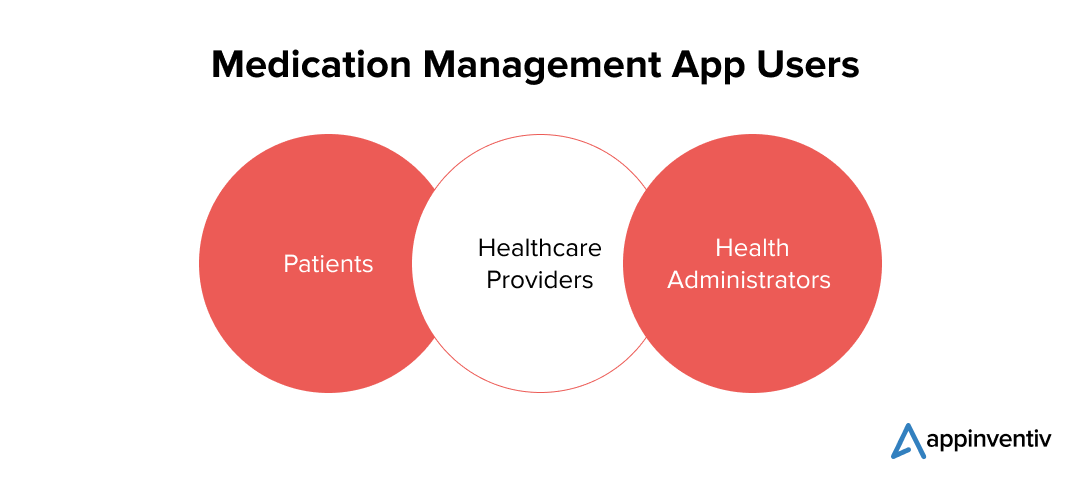
For Patients
- High-Risk Patients: These patients have serious health conditions and thus need an app that supports continuous monitoring and adherence.
- General Patients: These patients have chronic health conditions (diabetes, hypertension, and mental health) and manage their medication regimens.
- Elderly Patients: Senior patients may require timely medication reminders and alerts. They need a simple interface and a user-friendly app.
- Post-Surgical or Acute Care Patients: These patients have acute health issues or need care post-surgery. They need an app that requires short-term tracking and adherence support.
For Healthcare Providers
- Doctors: These users broadly involve physicians and clinic doctors who prescribe and monitor medications. They need an app to track medication adherence, view reports, and dose updates, and make all data-driven adjustments in the treatment plan.
- Pharmacists: This type of app users need a medication management system to check medical prescriptions, track prescription refills, send refill alerts, and engage with patients to ensure everything is safe and manageable.
- Pharmaceutical Representatives: This group of users can reap the benefits of the medication management app by deploying data analytics and collecting valuable insights, such as patient medical history and medication usage trends. This helps the pharmaceutical representatives to enhance support for therapies and specific drugs.
For Health Administrators
- Hospital and Clinic Administrators: These app users oversee patient care management and medication adherence programs. Thus, they may use app insights to assess treatment efficacy and enhance patient outcomes.
- Insurance and Health Plan Managers: These health insurance providers need a trackable app to monitor medication adherence to ensure quality care, reduced healthcare costs, and improved health outcomes among their members.
What are the Types of Medication Management Apps?
Medication management apps help patients and healthcare providers organize, track, and manage medications, ensuring adherence and reducing errors. Here are some common types of medication management apps:
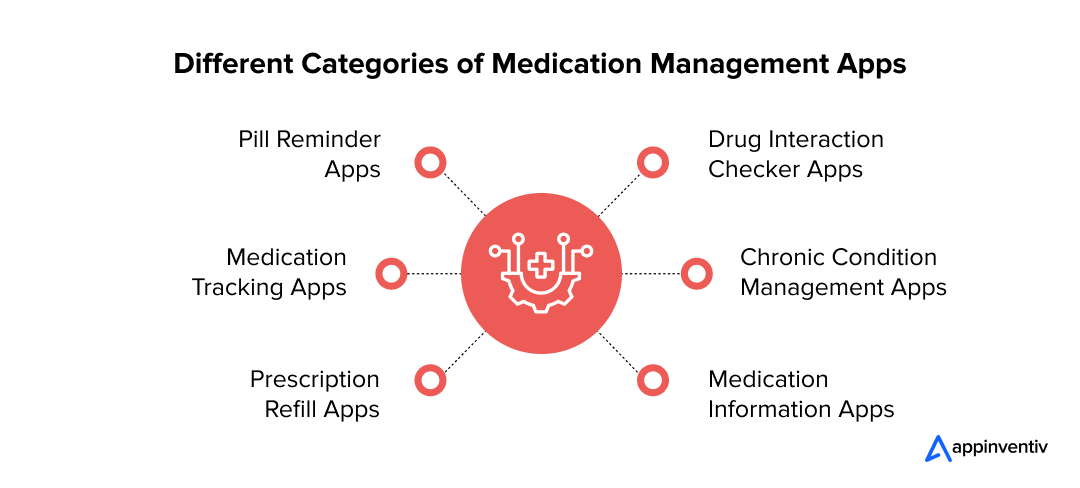
Pill Reminder Apps
These apps send alerts or notifications to remind users to take their medications on time. They allow users to set up schedules for multiple medications and may include features like dosage instructions and refill reminders.
[Also Read: Medicine Delivery App Development: Step-by-Step Guide, Features, and Cost Analysis]
Medication Tracking Apps
These apps track medication adherence by logging when users take their meds. This tracking history can be shared with caregivers or healthcare providers for better monitoring and support.
Prescription Refill Apps
Some apps streamline the prescription refill process, allowing users to order refills directly through the app and notify them when it’s time to reorder. Many of these apps integrate with pharmacies for automatic refills.
Drug Interaction Checker Apps
These apps help users check for potential interactions between medications, providing alerts or advice when certain drugs should not be taken together. This feature is especially useful for users on multiple medications.
Chronic Condition Management Apps
Designed for users with chronic conditions like diabetes, hypertension, or asthma, these custom medication management apps help them manage medications and track health metrics related to their condition, often integrating data from wearable devices.
Medication Information Apps
These custom medication management app developments provide detailed medication information, including potential side effects, dosage guidelines, and alternatives. They can help users understand their medications better and reduce risks associated with misinformation.
Each type serves different aspects of the medication management system, from simple reminders to comprehensive care, catering to a wide range of user needs.
How Does a Medication Management App Work?
A medication management app provides healthcare a medium to interact with patients, helping streamline medication adherence and management. Here’s how it works for each:
| For Healthcare Providers | For Patients |
|---|---|
| Prescription Management: Enter and manage prescriptions and update dosage per treatment. | Access to Prescription: Patients can easily access prescriptions and other medication records to reduce the chance of incorrect doses. |
| Patient Monitoring: You can access real-time insights to monitor patients’ medication adherence. | Medication Reminders: Apps give timely medication reminders that reduce the chance of missing doses. |
| Refill Reminders: This in-built feature provides reminders to ensure patients have adequate supplies. | Refill Alerts: The app gives timely reminders to refill the dose, ensuring patients don’t run out. |
| Data Sharing & Communication: Enables secure data sharing of patients’ medication history and logs. | Tracking & Logging: The app allows patients to log in and share their records with their healthcare provider. |
| EHR Integration: These apps are easily integrated with EHR (Electronic Health Records) to keep health records. | Quick & Easy Connection: The app allows patients to connect to their doctors easily regarding reports. |
Medication Management App Challenges: Key Obstacles to Overcome
Medication management app development helps address several challenges in healthcare, making it easier for patients, caregivers, and healthcare professionals to stay on top of medication regimens. Here are some of the challenges solved by these apps:
Medication Adherence
One of the biggest challenges is ensuring that patients take their medications on time and as prescribed. Apps can send reminders and track doses, improving adherence and reducing the risk of missed or incorrect medication.
Medication Errors
Patients may accidentally take the wrong medication or dosage. Apps can provide detailed instructions, warnings, and checks to help prevent these errors.
Complex Medication Schedules
Many patients, especially those with chronic conditions, must follow complex medication schedules. Apps can organize and streamline these schedules, making it easier for patients to manage multiple prescriptions.
Drug Interactions
Medication interactions can be dangerous and difficult to track. Apps can notify users of potential interactions between prescribed drugs and over-the-counter medications.
Lack of Personalization
Medication management apps can be personalized based on a patient’s health condition, age, and specific needs, offering tailored recommendations, dosage adjustments, and tracking.
Data Management
Healthcare providers may struggle to access up-to-date medication information. These apps provide a platform for patients to track their medication history, making it easier for doctors to make informed decisions.
Patient Empowerment
Many patients find it challenging to manage their health information. Medication management apps empower patients to take control of their treatment by providing insights into their medication regimen and health status.
Communication Gaps
Miscommunication between patients and healthcare providers can lead to medication mistakes. Apps can facilitate communication by allowing patients to share updates and concerns with their healthcare team directly.
Medication management apps provide a modern solution to these ongoing healthcare challenges, improving medication safety and patient outcomes.
What are the Top Benefits of Medication Management App?
Here are some key benefits of medication management app development: These apps improve medication adherence by providing timely reminders for doses and helping users stay consistent with their medication schedules.
They also automate administrative tasks like prescription refills and appointment scheduling. Additionally, medication management apps enhance patient care by offering personalized treatment plans based on individual health data.
Let’s dive deeper into these benefits of medication management app development.
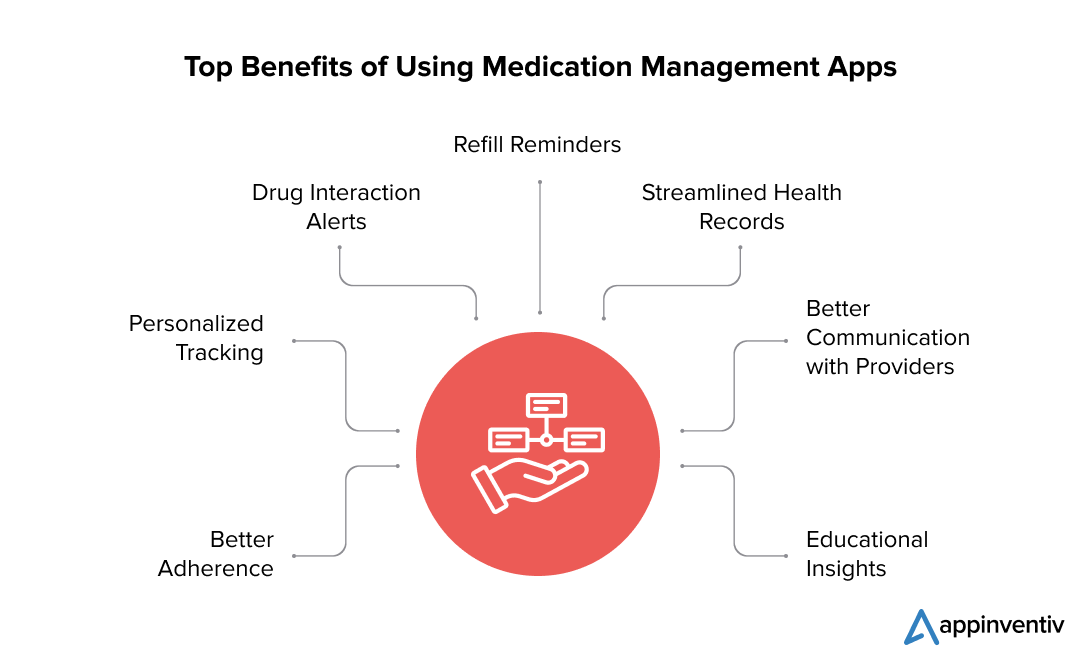
Better Adherence
Medication management apps improve adherence by providing timely reminders for each dose, making it easier for users to stay consistent with their medication schedules. This is especially beneficial for individuals managing multiple medications or chronic conditions, where consistency directly impacts health outcomes. By reinforcing daily routines, the app helps reduce missed doses, leading to better health results and fewer complications.
Personalized Tracking
These apps let users personalize their medication plans, including specific dosages, times, and notes. With individualized tracking, users can manage their health needs in a way that aligns with their routines, leading to more effective medication management. The patient medication management software development also allows users to adjust their plans over time, giving them control to make changes as their health needs evolve.
Drug Interaction Alerts
Medication management apps help users avoid dangerous combinations by providing real-time alerts about potential drug interactions. This feature promotes safer medication use by cross-referencing prescriptions to warn of adverse reactions. By having this information readily available, users can make informed choices and discuss any concerns with their healthcare providers, fostering a proactive approach to health management.
Refill Reminders
Running out of medication can interrupt treatment and risk health setbacks. Patient medication management software development sends refill reminders, helping users manage their supply and ensuring they don’t miss any doses due to unavailable prescriptions. Users can also plan and set alerts for medications with varying refill frequencies, reducing the chances of treatment gaps.
Streamlined Health Records
Businesses can store prescriptions, medical histories, and relevant health information in one place. This makes it easy to reference records, fostering better-informed decisions during medical visits. This centralized record-keeping improves convenience and adds a layer of organization, making it easier to manage multiple prescriptions and health records.
Better Communication with Providers
Medication logs and health data from the app can be shared with healthcare providers, enabling clear and effective communication. This helps providers monitor patient adherence and adjust treatment plans based on real data. With a clear view of a patient’s medication habits, providers can offer more tailored guidance and support, improving overall care quality.
Educational Insights
Many apps provide access to information on medications, side effects, and conditions. This empowers users with knowledge, helping them better understand their treatments and make informed health decisions. By learning more about their medications, users become active participants in their care, leading to improved confidence and potentially better outcomes.
What are the Popular Use Cases of Medication Management Apps?
How medication management apps can empower healthcare providers to enhance operations, improve patient outcomes, and drive innovation through various medication management technology use cases.
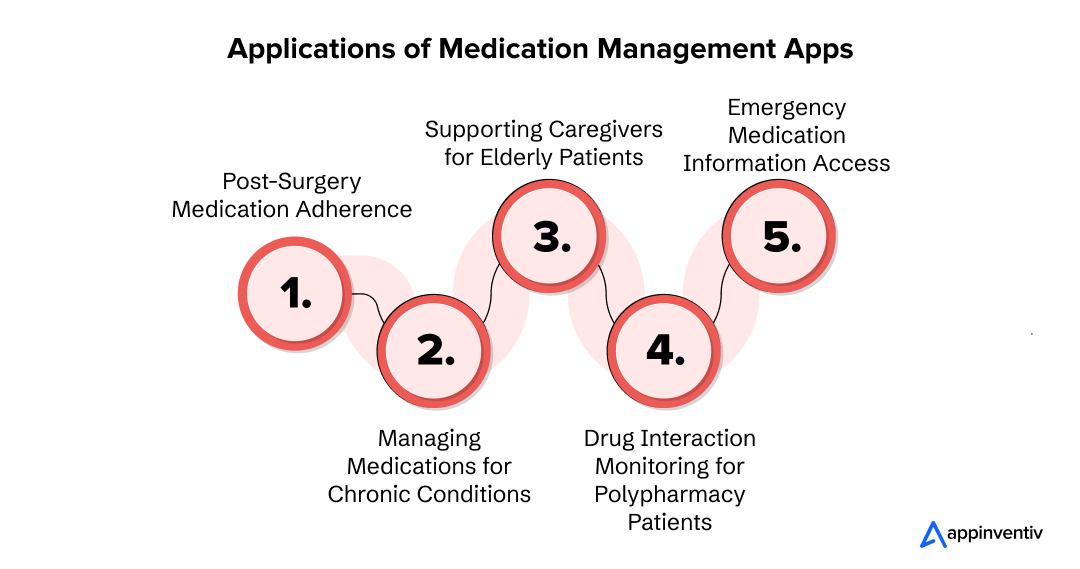
Post-Surgery Medication Adherence
After surgery, patients often have complex medication regimens that involve painkillers, antibiotics, and other medications. A medication management app can help by providing precise reminders and dosage instructions, reducing the risk of missing doses or taking medications incorrectly. It also enables healthcare providers to monitor adherence remotely, ensuring the recovery process stays on track.
Real-World Example: Medisafe
Medisafe is one of the prominent examples of medication management software. The organization helps patients manage complex post-surgery medication regimens by providing reminders and dosage instructions. It also allows healthcare providers to monitor adherence remotely, ensuring proper recovery and medication use.
Managing Medications for Chronic Conditions
For chronic conditions like diabetes or hypertension, patients need to take multiple medications daily, often with varying dosages or schedules. A medication management software development can organize and track these medications while syncing with wearable devices to monitor related health metrics, like blood glucose levels or blood pressure.
The app can alert users for missed doses, helping to prevent complications associated with chronic disease management.
Real-World Example: My Diabetes Home
My Diabetes Home helps patients with chronic conditions like diabetes by tracking medications and syncing them with wearables. It offers personalized reminders and integrates health metrics, improving chronic disease management.
Supporting Caregivers for Elderly Patients
Elderly patients, especially those with memory issues, often rely on caregivers to manage their medications. A medication management app with caregiver access allows family members or caregivers to set reminders, track adherence, and receive notifications if a dose is missed.
This remote monitoring enhances caregivers’ peace of mind by ensuring that elderly patients adhere to their prescribed medication schedules.
Real-World Example: CareZone
CareZone is one of popular examples of medication management software. CareZone supports caregivers by offering medication reminders, tracking adherence, and providing remote monitoring of elderly patients. It also helps caregivers organize medication lists and receive notifications if doses are missed.
Drug Interaction Monitoring for Polypharmacy Patients
Many patients, especially older adults, take multiple medications (polypharmacy), which increases the risk of dangerous drug interactions. Medication management apps can help by checking for potential interactions when new medications are added, alerting users and healthcare providers to risks, and offering safer alternatives if needed. This is particularly useful for patients who may see multiple specialists prescribing different medications.
Real-World Example: MedAware
MedAware monitors drug interactions for polypharmacy patients, alerting users and healthcare providers to potential risks. It offers safer alternatives and helps manage multiple prescriptions to ensure patient safety.
Emergency Medication Information Access
Healthcare providers need quick access to patients’ medication histories in emergencies to make informed decisions. Telehealth app development for medication management can provide this data in real-time, allowing emergency responders or hospital staff to view current prescriptions, dosages, and known allergies.
This feature ensures immediate access to crucial information to help avoid adverse drug events and inform critical care decisions.
Real-World Example: Health Gorilla
Health Gorilla is a well-known example of medication management Software. It provides real-time patient medication history access, enabling emergency responders to make informed decisions. It integrates data from multiple sources to ensure immediate access to critical medication information.
What are the Essential Medication Management App Features?
For a medication management app to be effective, it should have features that ensure users adhere to their medication schedules, stay informed, and track their health. Here are essential medication management app features:
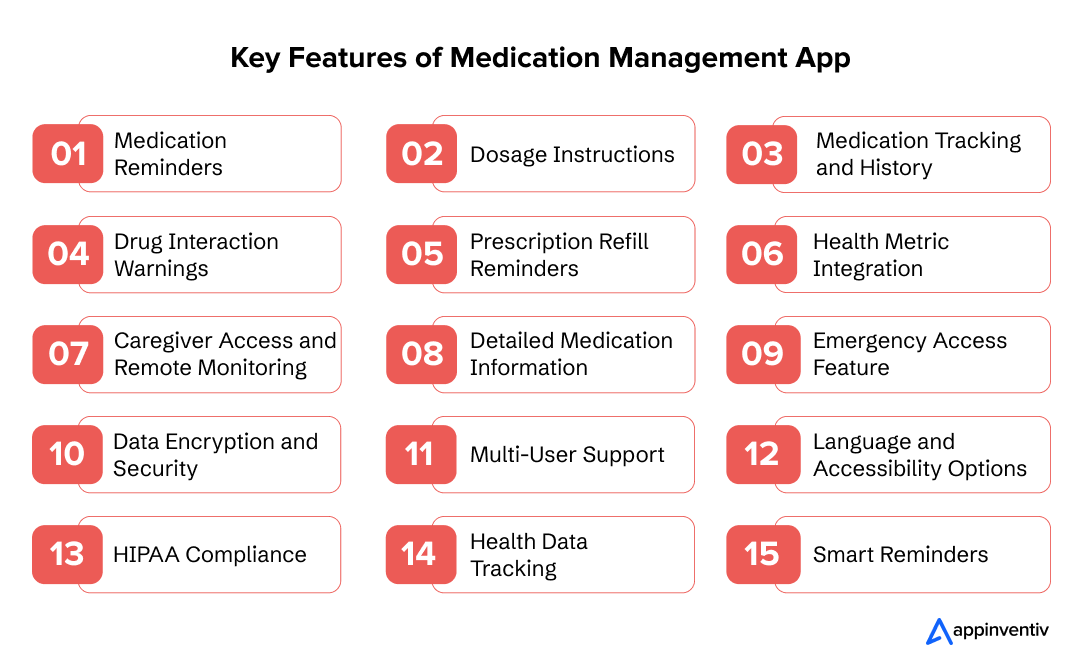
Medication Reminders
Medication reminders are one of the popular features of medication management apps. This feature should support various schedules, such as daily, weekly, or monthly, and allow users to set specific times.
Dosage Instructions
Clear instructions for each medication, including dosage, frequency, and timing, help users understand how to take their medications correctly. This can reduce the likelihood of errors.
Medication Tracking and History
Logging when medications are taken enables users and caregivers to monitor adherence over time. The app should store this history for easy reference and allow for notes or updates.
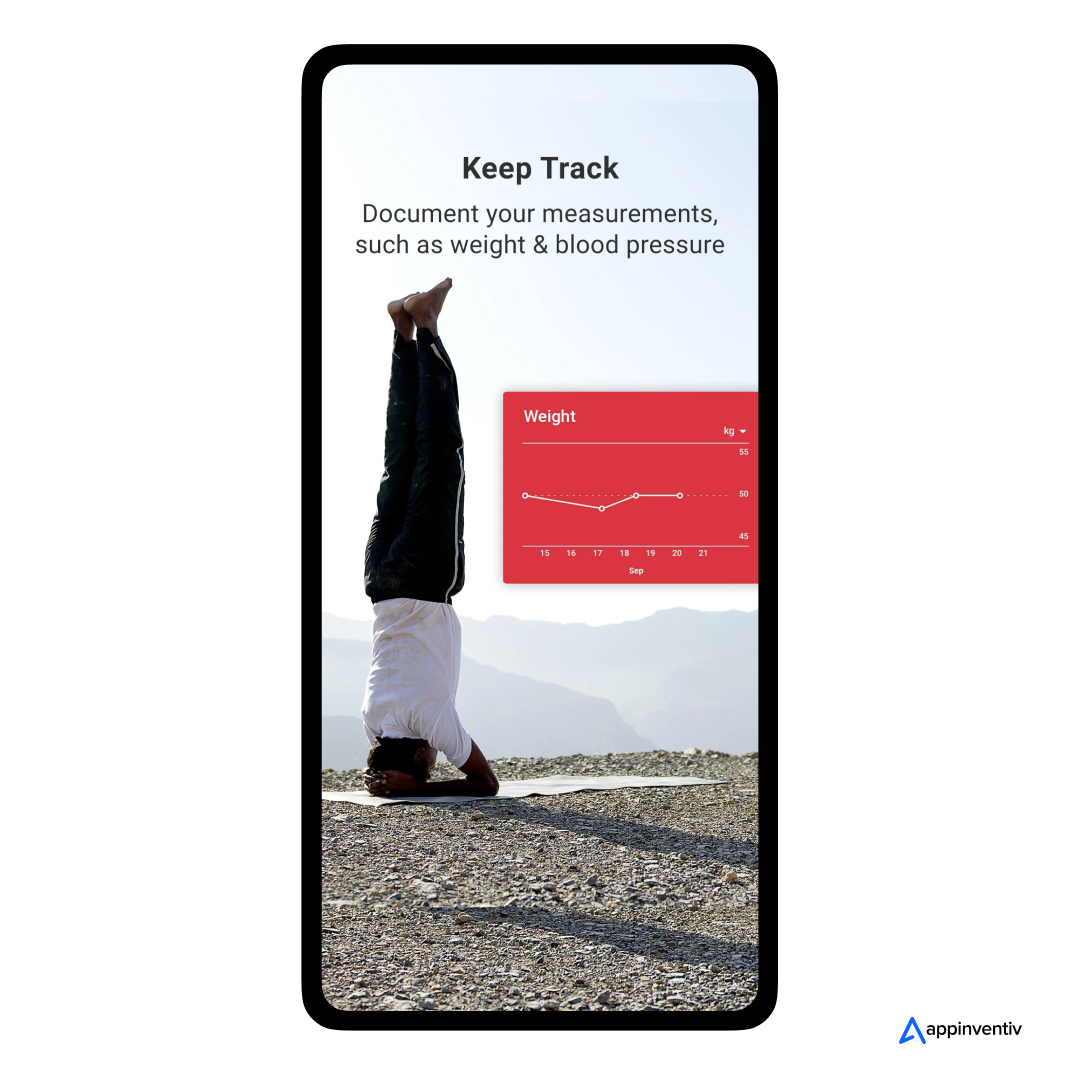
Drug Interaction Warnings
Drug interaction warnings are a well-leveraged feature of a medication management app. A drug interaction checker alerts users to potential adverse interactions when taking multiple medications, preventing risks associated with combining incompatible drugs.
Prescription Refill Reminders
This medication management app feature reminds users when to refill prescriptions, ensuring they never run out of essential medications.
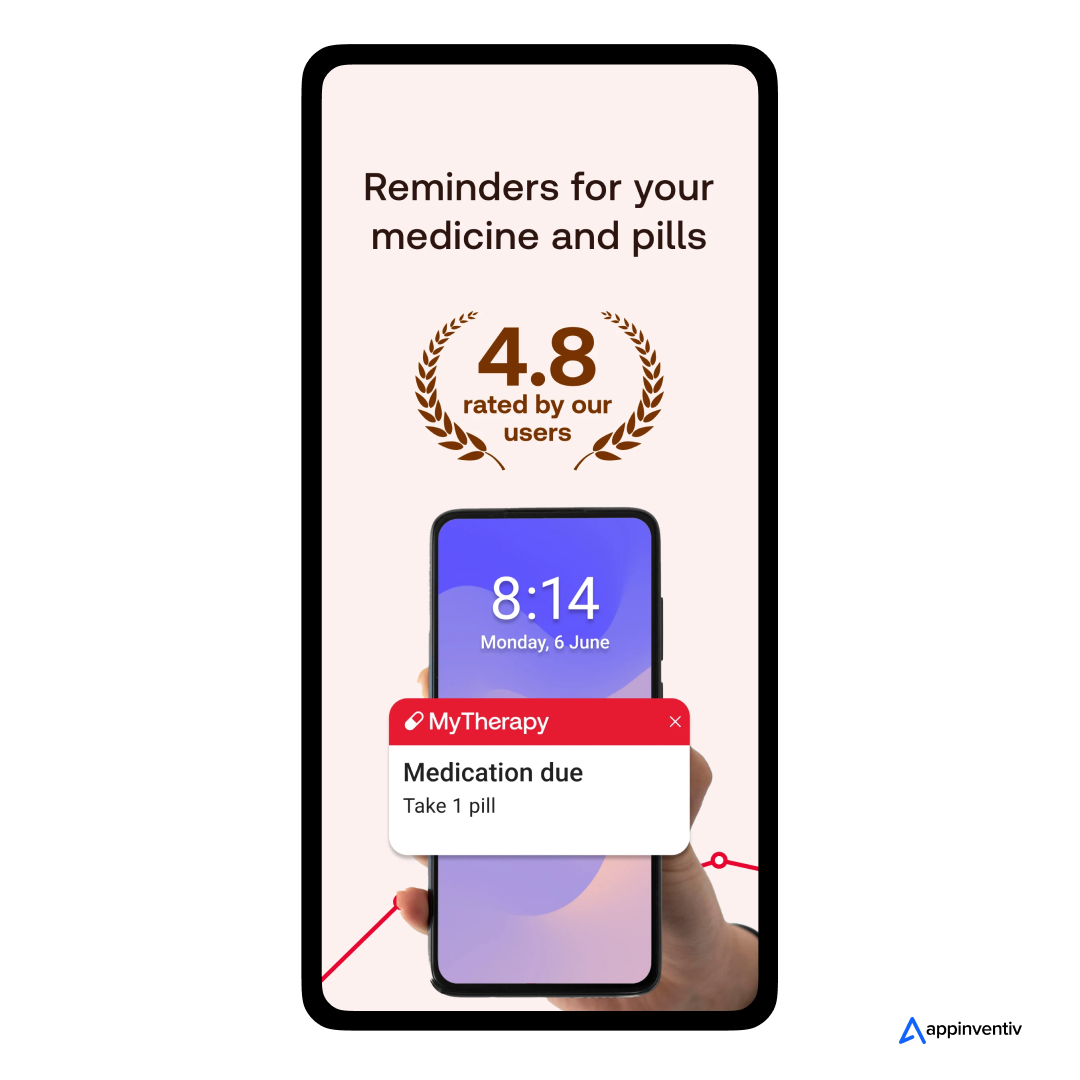
Health Metric Integration
Integration with health metrics (e.g., blood pressure, glucose levels) for chronic condition management. Syncing with wearable devices or health monitoring tools can provide a holistic view of the user’s health.
Caregiver Access and Remote Monitoring
This feature allows caregivers or family members to monitor adherence remotely. It is particularly helpful for users who need extra assistance, like elderly patients or those with memory issues.
Detailed Medication Information
Access to information on each medication, including possible side effects, precautions, and alternative names. This helps users make informed choices and improves their understanding of each medication.
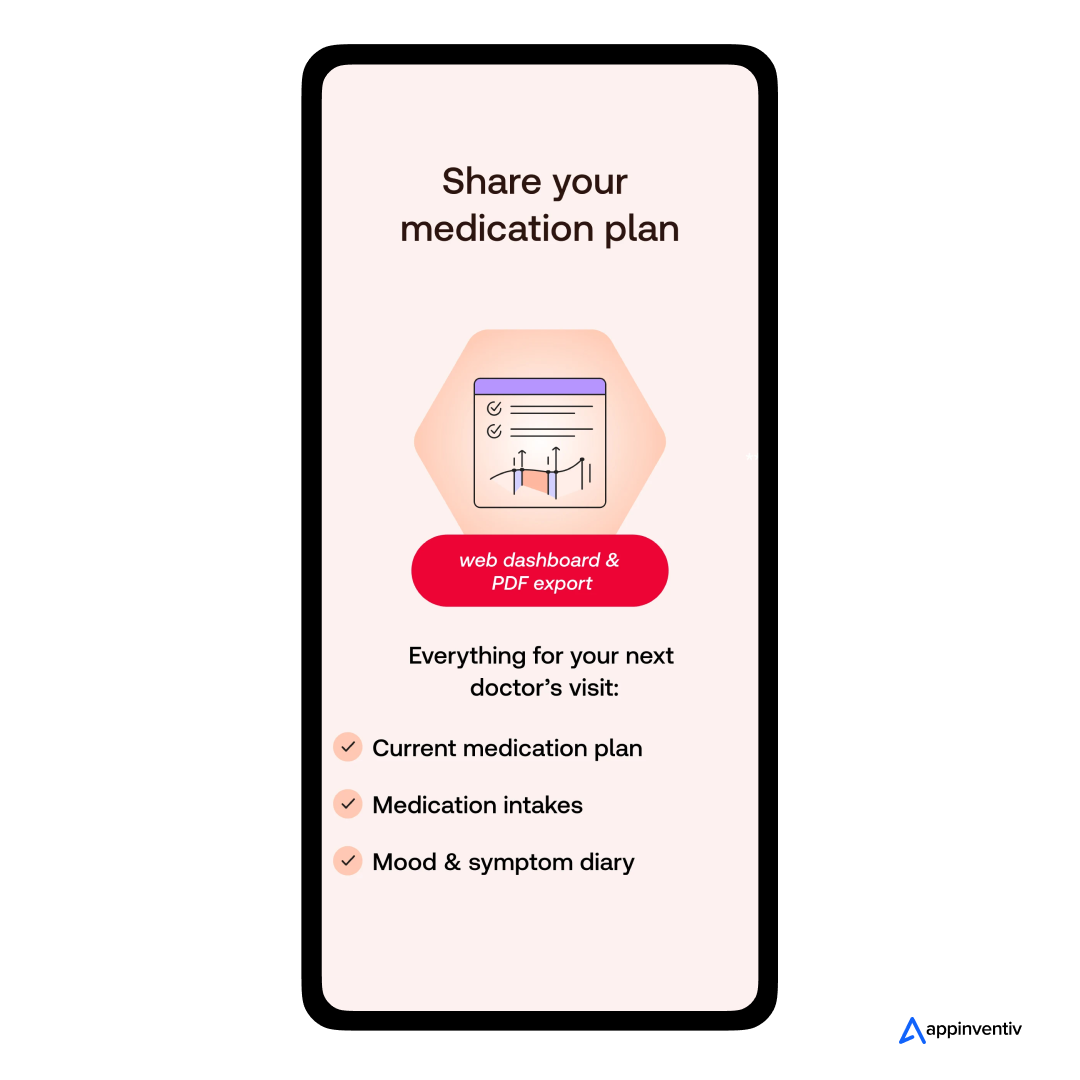
Emergency Access Feature
A quick-access feature allows emergency responders or healthcare providers to view the user’s medication list, allergies, and health history. This can be life-saving in critical situations.
Data Encryption and Security
Strong data protection measures to ensure that users’ medical information is kept private and secure, complying with regulations like HIPAA (in the U.S.) or GDPR (in the EU).
Multi-User Support
This feature allows for multiple user profiles, allowing families to manage medications for several individuals from a single app. It is ideal for caregivers or families with multiple dependents.
Language and Accessibility Options
Customizable language options and accessibility features, such as voice commands or large font sizes, make the app user-friendly for all demographics, including elderly or visually impaired users.
HIPAA Compliance
The app ensures HIPAA compliance by encrypting health data, implementing role-based access controls, and maintaining audit trails to log all data interactions securely.
Health Data Tracking
Users can track symptoms, side effects, and vital signs (e.g., blood pressure) to monitor medication impact. Synced with wearables, this data supports health insights and treatment adjustments.
Smart Reminders
Smart reminders offer customized scheduling and adaptive alerts to boost adherence. Follow-up alerts and visual cues help users stay on track with their medication schedule.
How Much Does It Cost to Develop a Medication Management App?
Businesses frequently face cost-related challenges when developing medication management apps. The cost depends on several factors, including the complexity of features, the level of technological innovation, the quality of the UI/UX design, and the location of the development team.
Generally, as outlined above, the estimated cost to build a custom medication management app typically ranges from $40,000 to $300,000.
| Type of Application | Cost Estimation | Time Duration |
|---|---|---|
| Basic | $40,000 to $60,000 | 2-3 months |
| Intermediate | $60,000 to $90,000 | 3-6 months |
| Advanced | $90,000 to $300,000 | 9+ months |
What are the Influencing Factors of Medication Management App Development Cost?
- App Complexity: The more features and functionality your medication management app includes, the higher the cost. Complex features like medication reminders, integration with health devices, or advanced analytics require more development time and resources.
- Design Requirements: A sophisticated, user-friendly design increases medication management app development costs due to the time spent on UI/UX design, prototyping, and testing to ensure ease of use for patients and healthcare professionals.
- Development Team and Location: The development team’s expertise and location significantly impact medication management app development cost. Teams in regions with higher labor rates, such as North America or Europe, will typically charge more than teams in Asia or Eastern Europe.
- Third-Party Integrations: Integrating external services, such as pharmacy databases, health tracking devices, or payment gateways, can increase costs due to the need for specialized knowledge, development time, and licensing fees.
- Compliance and Security Standards: Meeting healthcare regulations like HIPAA or GDPR adds to the cost of developing a medication management app, as the app must be built with stringent security and privacy measures to protect sensitive patient data.
- App Platform: Developing the app for multiple platforms (iOS, Android) increases costs because it requires building and maintaining separate versions, each requiring distinct development processes and testing.
- Tech Stack: The choice of technology stack (e.g., programming languages, frameworks, cloud services) can impact medication management app development cost. Advanced or niche technologies may require specialized developers, increasing time and cost.
- Quality Assurance: Rigorous testing to ensure the app’s functionality, usability, and compliance with medical standards can increase the overall cost of medication management app development. Testing involves extensive effort across multiple devices and scenarios.
- Maintenance: Ongoing support, bug fixes, and updates to keep the app secure and functional add to long-term costs. Due to evolving medical guidelines and user feedback, regular updates are especially important for medication management apps.
Medication Management App Development Best Practices
The mobile medication management app development process involves adopting advanced technologies to improve various aspects of healthcare, from medication tracking to patient engagement.
Healthcare providers are partnering with top mobile medication management app development companies to integrate AI and IoT-driven solutions seamlessly. This helps enhance operational efficiency while ensuring better patient outcomes and long-term adaptability.
Here’s a step-by-step guide on the medication management app development lifecycle.
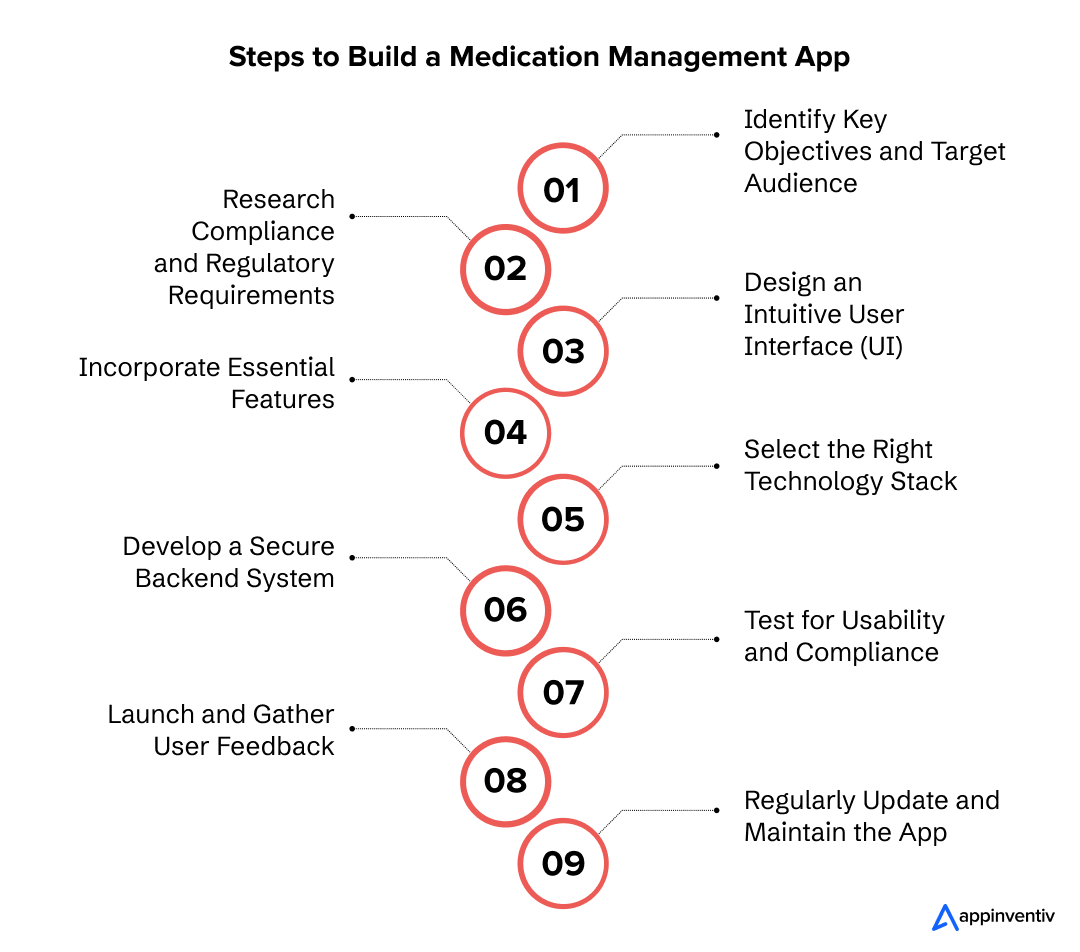
Identify Key Objectives and Target Audience
One of the most significant steps is identifying key objectives for medication management app development lifecycle. The medication management app development process begins with clearly defining the app’s purpose. This could range from setting medication reminders, tracking doses, or assisting caregivers in managing patient care. Identifying the target audience, such as elderly patients, healthcare providers, or caregivers, helps tailor the app’s features to meet users’ specific needs.
Focusing on these needs makes the app’s design and functionality more relevant and accessible, ultimately boosting user engagement. A well-defined purpose ensures that the app delivers value and meets the expectations of its intended audience.
Research Compliance and Regulatory Requirements
Ensure the app complies with healthcare data regulations such as HIPAA in the U.S. or GDPR in Europe to protect sensitive user information. Compliance with these laws secures data and establishes trust with users. Additionally, understand any region-specific healthcare standards that may dictate additional security protocols or data handling practices.
Design an Intuitive User Interface (UI)
An effective telehealth app development for medication management needs a clean, user-friendly interface accessible to all users, especially older adults. Use clear visuals, large buttons, and easy navigation to ensure functionality is immediately recognizable. A well-designed UI enhances user experience, making the app easy to use even for those less familiar with technology.
Incorporate Essential Features
Core features like medication reminders, dose tracking, and refill notifications are essential for a functional app. Enhance usability by including features like drug interaction warnings and secure prescription storage. By balancing these foundational and advanced features, the app can appeal to a wider range of users with varying needs.
Select the Right Technology Stack
The right technology stack is essential for building a responsive, secure, scalable app over time. Use a backend framework like Node.js or Django with mobile-friendly frontend options like React Native or Flutter.
Choosing a compliant and robust tech stack ensures high performance, data security, and device compatibility. This is one of the best practices for developing a medication management app that businesses should prioritize.
Develop a Secure Backend System
Since the app handles sensitive health data, security in backend development is paramount. To protect information, implement data encryption, secure user authentication, and regular vulnerability testing. Securing the backend safeguards user data and strengthens the app’s reliability and reputation.
Test for Usability and Compliance
Thorough testing helps ensure a smooth, intuitive user experience while verifying compliance with healthcare standards. Conducted usability tests across various user scenarios and devices and confirmed regulatory adherence. Regular testing identifies issues early, allowing fixes that improve functionality and regulatory alignment.
Launch and Gather User Feedback
After launching the app, actively collect user feedback to refine the app’s features and design. Feedback from real users provides insights into which features are effective and which may need improvement. This feedback-driven approach allows continuous improvement, making the app more useful and reliable.
Regularly Update and Maintain the App
Regular updates are crucial for keeping the app secure, compliant, and responsive to user needs. The maintenance plan includes adding new features, fixing bugs, and addressing security updates. Consistent app maintenance demonstrates commitment to user satisfaction and data security, helping build a trustworthy brand.
After exploring the medication management app development process, let’s move on to the top trends that are grabbing the attention of top businesses.
What are the Medication Management App Market Trends
The medication management app market trends are evolving rapidly, with several innovative developments shaping its future.
- One key trend is the integration of AI-driven personalization, where apps leverage machine learning to tailor medication schedules and reminders based on individual health data, optimizing adherence.
- Smart pill tracking is also gaining traction, with apps incorporating IoT-enabled devices that help track pill consumption in real-time, offering better accuracy and reducing human error.
- Another emerging trend is voice-enabled technology, allowing users, particularly the elderly or those with disabilities, to manage their medications hands-free.
- Another noticeable trend is cross-platform integration, where medication management apps sync with wearable devices, health apps, and even electronic health records, offering a more unified, seamless healthcare experience.
- Medical courier app development is started gaining traction for quick and easy delivery of medical supplies in the hospitals. That’s why the global medical courier market is projected to reach $9.3 billion by 2032.
These advancements are helping shape a future in which medication management systems are smarter, more accessible, and increasingly connected.
How Appinventiv Can Help You in Building a Medication Management App
Appinventiv brings extensive experience in healthcare app development, offering tailored solutions to create secure, intuitive, and compliant medication management apps. With expertise in regulatory compliance, we ensure adherence to healthcare standards like HIPAA and GDPR, safeguarding patient data and privacy.
Our team focuses on creating a user-friendly experience, incorporating essential features such as medication reminders, dosage tracking, refill alerts, advanced functionalities like EHR integration, and drug interaction warnings.
Through our specialized healthcare software development services, Appinventiv can leverage a robust technology stack and agile methodology to deliver a scalable, high-quality solution tailored to the needs of patients and healthcare providers.
Why Appinventiv is the Best Choice for Custom Medication Management App Development:
- Security & Privacy: We prioritize protecting your users’ health data, ensuring seamless integration with existing healthcare systems and compliance with regulations like HIPAA.
- User-Centric Automation: Our app solutions automate reminders, prescription tracking, and dosage management, enabling users to streamline their medication routines and improve health outcomes effectively.
- Expertise: With a proven track record of working with global clients across various healthcare sectors, Appinventiv drives innovation and enhances medication adherence through effective app solutions.
- Tailored Medication Solutions: Appinventiv provides a customized medication management system designed to meet your users’ specific needs, ensuring effective and personalized medication tracking.
- Agile Development Approach: Our agile development methodology ensures fast and efficient delivery of your medication management app while maintaining the highest quality and user experience standards.
- Tech Know-how: Leveraging the latest advancements in mobile app development, we provide innovative features such as dosage tracking, drug interaction warnings, and secure data storage, ensuring a cutting-edge solution for medication management.
Partner with us to harness the transformative power of a medication management app and drive exceptional results through advanced healthcare innovation.
FAQs
Q. What is medication management software?
A. Medication management software is a digital solution designed to help patients, caregivers, and healthcare providers monitor, organize, and manage medication schedules. These platforms typically include features like medication reminders, dose tracking, refill alerts, and interaction warnings, making it easier for patients to adhere to their prescriptions. For healthcare providers, this software aids in ensuring accurate dosage and timing, reducing medication errors and improving patient outcomes. Medication management software development can be standalone apps or integrated with broader healthcare systems to provide a comprehensive approach to patient care.
Q. How much does medication administration software cost?
A. The cost of developing medication administration software ranges from $40,000 to $300,000. This range depends on the features and complexity of the app, with basic functionalities like reminders and dose tracking on the lower end. More advanced versions, which include features like drug interaction checks and EHR integration, can reach the higher end of the cost spectrum. Maintenance, updates, and regulatory compliance may add to the overall expense.
Q. What considerations are important for building a compliant and secure medication management app?
A. Ensuring compliance with healthcare regulations like HIPAA and GDPR is crucial for safeguarding patient data. Other considerations include implementing secure login and data encryption, allowing easy updates, and designing an intuitive interface for diverse user groups. Building a secure and compliant app helps gain user trust and meet legal requirements in the healthcare industry.
Q. What business advantages does a medication management app offer healthcare providers and pharmaceutical companies?
A. For healthcare providers, a medication management app can improve patient adherence, reduce hospital readmissions, and enhance patient engagement, leading to better health outcomes and potential cost savings. Pharmaceutical companies benefit from increased brand loyalty by supporting patients in managing their medications effectively, which can strengthen customer relationships and improve brand reputation in the healthcare industry.
Q. What are the main medication management app challenges businesses face?
A. The main challenges businesses face with the medication management app include ensuring seamless integration with healthcare systems, maintaining accurate medication tracking, and ensuring compliance with privacy regulations. Additionally, user engagement is a major challenge, as the app must be intuitive, accessible, and reliable to encourage consistent use and improve medication adherence.


- In just 2 mins you will get a response
- Your idea is 100% protected by our Non Disclosure Agreement.
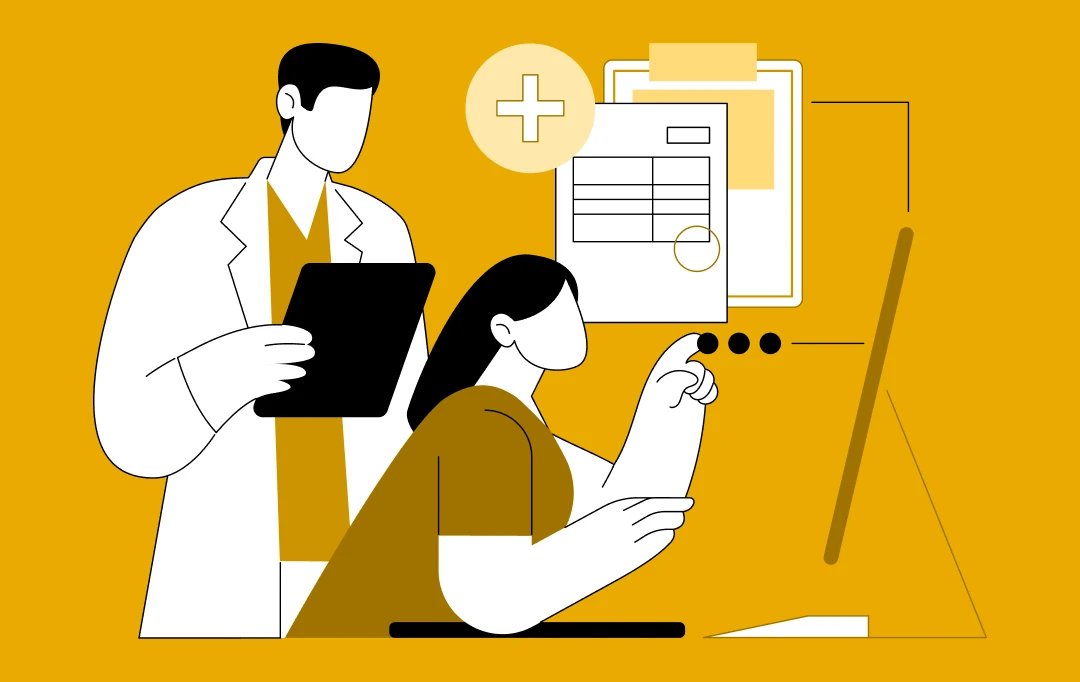
Healthcare IT Outsourcing: Key Benefits, Best Practices, and Implementation Process
Key Takeaways Reduce Costs by 30-40%: Convert capital IT expenses to predictable operational costs, eliminating the need for large in-house teams and infrastructure. Focus on Core Patient Care: Free up internal resources from IT management to concentrate on core healthcare services, innovation, and growth. Ensure Compliance & Mitigate Risk: Leverage expert partners to navigate HIPAA…
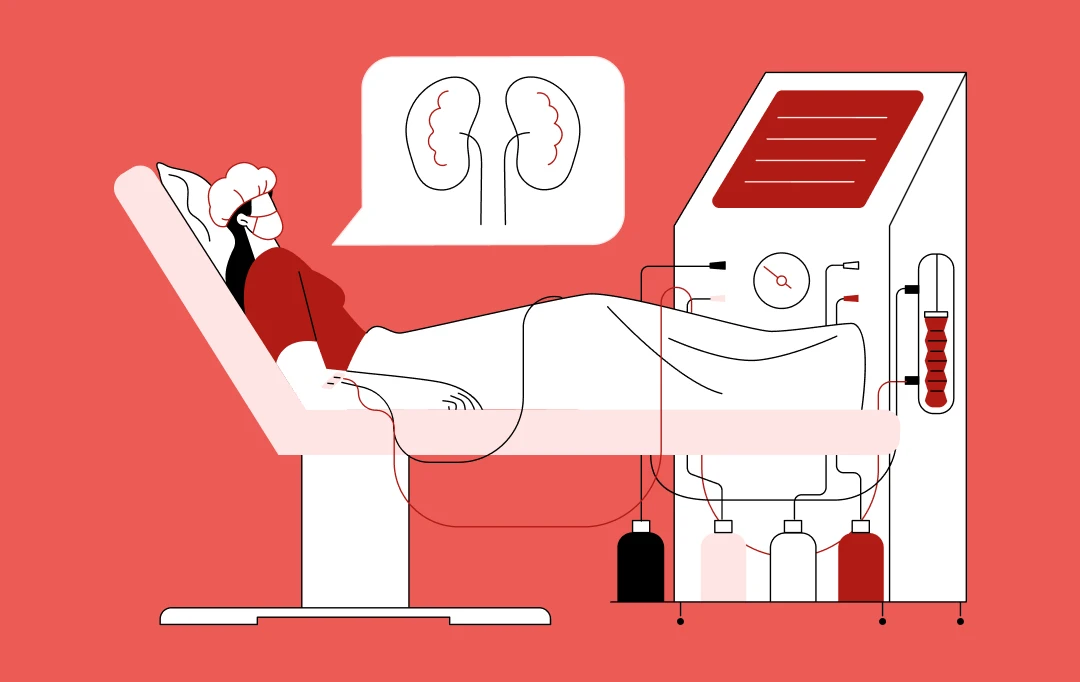
How AI-Powered Virtual Health Assistants Are Enhancing Remote Patient Monitoring
Key takeaways: Remote patient monitoring has the potential to reduce hospital readmissions by up to a quarter, shifting healthcare from reactive to proactive care through continuous, real-time health tracking. The U.S. health intelligent virtual assistant market is expected to reach $1.87 billion by 2030, driven by the growing demand for continuous care, virtual consultations, and…
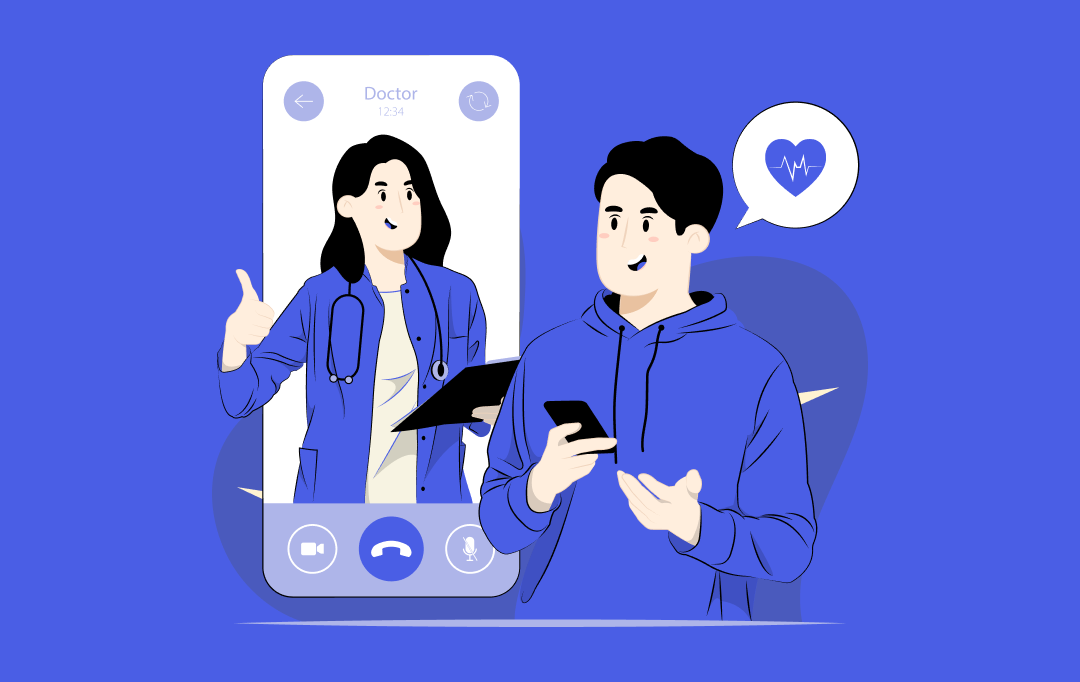
Why Telehealth Security is Non-Negotiable for Patient Trust and How to Achieve It
Key takeaways: Telehealth security is crucial for patient trust and the continued adoption of digital healthcare services. The rising tide of cyber threats, from ransomware to inadequate authentication, poses significant risks to patient data and provider reputation. Implementing robust security measures like end-to-end encryption, multi-factor authentication, and regular audits is non-negotiable. Compliance with regulations like…


















